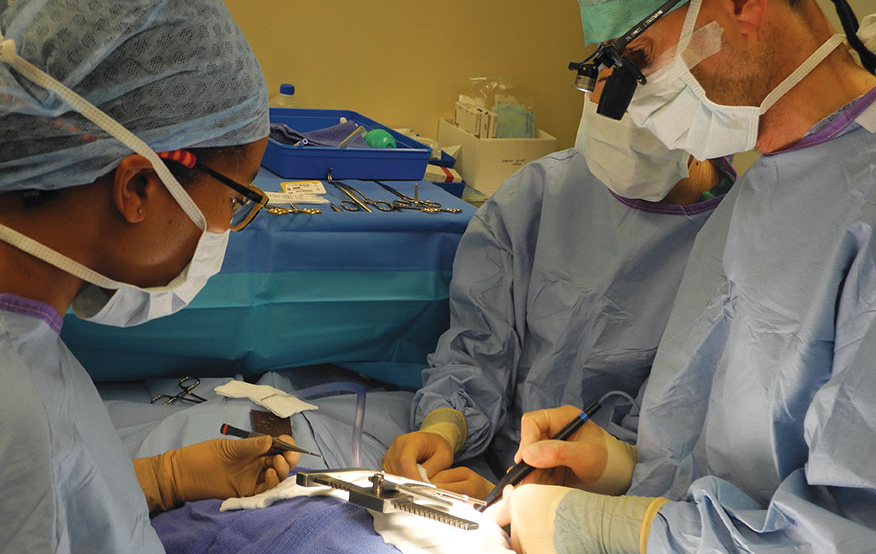A European first at the RVC
Clinical Connections – Spring 2018
A Royal Veterinary College (RVC) team is the first in Europe to save a dog with the life-threatening condition tricuspid valve dysplasia with open heart valve repair surgery.
The year-old boxer, Brutus, had a congenital heart valve deformity that made it extremely leaky. The tricuspid valve dysplasia was causing what is described as “torrential” valve regurgitation. The severe incompetence of Brutus’ valve left him feeling weak because of heart failure, which would severely shorten his life expectancy.
The surgeon who led the operation, Professor Dan Brockman, also conducted the world’s first successful operation to correct a stenotic tricuspid valve, in 2016. The condition of that dog, Mabel, differed from that of Brutus in that Mabel’s tricuspid valve allowed only a restricted amount of blood to flow, whereas the opposite was true for Brutus.
Explaining the pioneering surgery and why it was decided upon for Brutus, Dan Brockman, Professor of Small Animal Surgery, said: “Historically, we have tried to treat dogs with this condition by replacing the tricuspid valve with an artificial valve but it became apparent that they don’t do well with valve replacement because blood clots form on the valve creating valve failure. So for some years I have been keen on the idea of trying to reconstruct the valve using the native valve tissue, because one of the underlying abnormalities is that part of the valve is stuck down very close to the septal wall of the right ventricle.
“By cutting the attachments of that valve to the wall of the ventricle, we can allow the valve leaflet to move a bit more and create a smaller surface area through which leakage can occur. I discussed this idea with several colleagues internationally and one of my friends in the USA had a chance to attempt this procedure a couple of times before we had the chance to do it at the RVC. Then Brutus came along, a young boxer dog with severe congenital tricuspid valve dysplasia, and owners that were absolutely determined to try everything they could to treat him.
“I had a very honest discussion with them and said it was very difficult to promise that it was going to be a success, having not done it before, but without some treatment Brutus had very limited time left. He’d been in heart failure for some months by then.”
Annuloplasty
Surgery involved completely freeing the valve leaflets from their abnormal attachments and re-suspending the valve leaflets using Gore-Tex suture material, also it was necessary to make the valve opening much smaller using a technique called annuloplasty. This involves suturing a strip of Gore-Tex into the orifice that the valve sits in to make that orifice smaller.
Scar tissue grows over Gore-Tex, so after the first six weeks or so it is made secure by the body. There is a risk in the weeks after the operation that the Gore-Tex material can float off, but regular follow-ups by the RVC cardiology team have found that the material is still in place.

The RVC has a dedicated cardio-thoracic surgery team, which includes Professor Brockman, Fellow in Cardiothoracic Surgery Poppy Bristow, a Cardiothoracic Perfusion Fellow, a Cardiothoracic Theatre Nurse and a Surgery Coordinator. RVC veterinary anaesthetists with experience of cutting-edge open heart surgeries also played a crucial role. The Cardiology Service was involved in assessment and the RVC’s Critical Care Service supported Brutus in the recovery period.
Since the operation, Brutus has been able to come off almost all medication and is no longer treated for heart failure. As leaking from the valve cannot be completely eliminated, there is a likelihood that Brutus will have cardiac problems at some point in the future, but the success of this operation should have added years to his life and given him a much more active life. The dogs operated on by the veterinary surgeon in the USA have done well and Brutus is expected to continue to have an active and enjoyable life.
For small animal referrals, please call: 01707 666365
Email: qmhaheartsurgery@rvc.ac.uk
